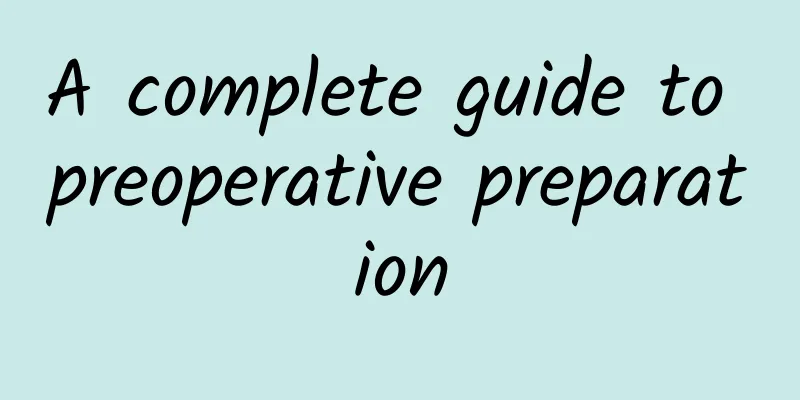A complete guide to preoperative preparation

|
Surgery, whether major or minor, is a major test for the body. In order to ensure the smooth progress of the operation and rapid recovery after surgery, adequate preoperative preparation is particularly important. This article will bring you a comprehensive preoperative preparation strategy to help you better cope with the challenges of surgery. 1. Psychological preparation: building a strong psychological defense line Surgery is a mysterious and scary process for most people. When facing an upcoming surgery, patients often feel nervous, anxious, or even fearful. This psychological state not only affects the patient's mood, but also has adverse effects on the surgical process and postoperative recovery. Therefore, psychological preparation is essential before surgery. Patients should face the surgery and understand its purpose, process and possible risks. Through detailed communication with the doctor, patients can better understand the necessity and safety of the surgery to reduce unnecessary concerns. At the same time, patients can also ask the doctor about precautions before and after the surgery to better cooperate with the operation. At the same time, patients should learn to adjust their mentality and stay optimistic. Although surgery is challenging, it also has the opportunity to be cured. Patients should trust the professional ability of doctors and medical teams and the confidence to overcome difficulties. You can relax your body and mind and relieve tension by listening to music, reading books and meditating. 2. Physiological preparation: laying a solid physical foundation for surgery In the preoperative preparation process, physiological preparation is the most direct and specific. It requires the patient to adjust his physical condition before the operation to ensure that the operation can be carried out smoothly and reduce the chance of postoperative complications. Patients should follow the doctor's advice to adjust their diet. Before surgery, patients should eat light and easily digestible food, and avoid greasy, spicy and irritating food. Improve the body's resistance and immunity while maintaining adequate nutritional intake. Patients with special dietary needs, such as diabetics, should follow the doctor's dietary recommendations to control blood sugar levels. Patients should adjust their work and rest schedules and ensure adequate sleep. Before surgery, patients should try to avoid bad habits such as staying up late and fatigue, and maintain a normal work and rest schedule. Adequate sleep can help the body recover and increase tolerance to surgery. In addition, patients should also give up bad habits, such as smoking and drinking. These bad habits may cause harm to the human body and increase the risk of surgery. Therefore, patients should be asked to quit smoking and drinking as early as possible before surgery to create good conditions. Patients should also participate in appropriate physical exercise. Appropriate exercise can enhance the body's endurance and strength, and improve the success rate of surgery. However, when exercising, one should avoid overexertion and excessive injury, which may have a certain impact on the surgery [1]. 3. Preoperative examination: an important part of ensuring surgical safety Preoperative examination is an important part of the preoperative process. It helps doctors understand the patient's condition and physical condition through comprehensive evaluation of the patient's physical condition, and provides an important basis for formulating surgical plans [2]. 1. Preoperative blood tests are essential, and blood tests can help doctors understand the main indicators of patients' blood routine, coagulation function, liver and kidney function, etc. These indicators can better reflect the patient's physical condition and surgical risks, and help doctors formulate surgical plans more accurately. 2. Electrocardiogram is also an important step in preoperative examination. Electrocardiogram can evaluate the patient's heart function and find out possible heart diseases or abnormalities. Electrocardiogram is particularly important for patients with heart disease or suspected heart disease. It helps doctors understand the patient's heart condition and ensure that no heart complications occur during surgery. 3. Imaging examinations are essential for preoperative examinations. With the help of imaging examinations such as X-rays, CT, and MRI, we can more intuitively understand the patient's lesions and surrounding tissue structures. This can help doctors develop more accurate surgical plans to reduce surgical risks and complications [3]. 4. The patient also needs to undergo other related examinations, such as urine routine, stool routine and infectious disease screening. These examinations can give a holistic understanding of the patient's physical condition and ensure the safety and effectiveness of the operation. At the same time, the patient should actively cooperate with the doctor's examination and provide true information such as medical history and physical condition. Preoperative preparation is of great significance to the success of the operation. Through adequate preparation, physiological preparation and preoperative examination, patients can more calmly cope with the challenges of surgery and ensure the safety and effectiveness of the operation. At the same time, patients should actively cooperate with the doctor's guidance and opinions and take responsibility for their own health. 4. Drug preparation: plays a vital role in surgery Drug preparation plays a decisive role in preoperative preparation and directly affects intraoperative safety and postoperative recovery results. Appropriate drug preparation helps stabilize the patient's condition, reduce surgical risks and postoperative recovery. For patients with chronic diseases who are receiving medication, such as hypertension and diabetes, they should ensure that they can take medication on time before surgery to maintain the stability of their condition. This type of medication is very important for controlling the patient's blood pressure, blood sugar and other indicators, and can ensure that the operation is in a relatively stable physiological environment. At the same time, patients should tell their doctors in detail what medicines they are taking and the dosage, so that the doctor can adjust the surgical plan according to the patient's specific situation. For patients who need to use special medications before surgery, such as anticoagulants and antibiotics, they must use them strictly under the guidance of a doctor. Anticoagulants can prevent thrombosis and reduce the risk of bleeding during surgery; and antibiotics can prevent postoperative infection. The use of such drugs must be accurate in dosage and time, and patients must follow the doctor's instructions to take the drugs on time and in the prescribed amount. In addition, during the preoperative preparation period, patients should also be careful to avoid using drugs that may affect the outcome of the surgery or increase the risk of the surgery. For example, some over-the-counter drugs, health products, or Chinese herbal medicines may contain substances that conflict with surgery. Patients should identify and stop using them under the guidance of a doctor. Adequate preoperative preparation is crucial to the success of the operation. Through psychological preparation, physiological preparation, and preoperative examination, patients can better meet the challenges of surgery, ensure smooth operation and rapid recovery after surgery. Let us escort healthy surgery together! References [1] Li Qiuhong. Taking you to understand cesarean section - preoperative preparation to postoperative recovery [N]. Shanxi Science and Technology News, 2024-09-12 (A03). [2] Cheng Xiaoyan, Gong Yan. Sharing of ERCP preoperative preparation and postoperative care methods[J]. Everyone's Health, 2024(24):127. [3] Lu Wanxin, Yao Meimei, Yin Jun. Preoperative preparation and postoperative care of thyroid nodules[J]. Family Medicine (Second Half of the Month), 2024(08):60-61. Disclaimer: The pictures in this article are from the Internet |
<<: Does thick blood mean high blood lipids?
>>: Can I get the nine-valent vaccine after getting the two-valent (four-valent) cervical vaccine?
Recommend
Turning off the lights and looking at your phone can be very harmful! Get rid of this habit now...
Expert of this article: Xu Qibin, associate chief...
The harm of chitosan gynecological gel
Chitosan gel is a care product, not a medicine. A...
Why are there fibers in durian flesh? Why doesn't Hainan produce durian?
Durian pulp contains a lot of sugar, high in calor...
A woman with gums showing when she smiles has bad luck
The front teeth are rooted in the kidneys, that i...
What skin care products are good for moisturizing and removing acne?
People's skin will start to take shape when t...
How to maintain the uterus?
Having a healthy body is very important for every...
Caesarean section 1 year and 3 months pregnant
Generally, basic contraceptive measures are recom...
Take emergency contraceptive pills twice a month
If women want to take emergency contraception, th...
What are the symptoms of a boy at eight and a half months of pregnancy?
Pregnancy is extremely important to people, and m...
The dangers of abortion
Abortion is very common nowadays. Many women will...
What to do if you catch a cold during early pregnancy?
During pregnancy, we need to pay great attention ...
Lochia after cesarean section
A woman will go through the process of pregnancy ...
Reasons for early second pregnancy
After a pregnant woman becomes pregnant, as the n...
Which posture is easy to get pregnant?
In order to prepare for pregnancy, mothers should...
The reasons why the vulva sometimes itches
Vulvar itching is a very common symptom of gyneco...









